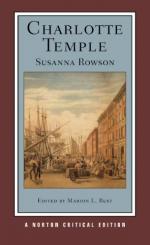Yes, my young friends, the tear of compassion shall fall for the fate of Charlotte, while the name of La Rue shall be detested and despised. For Charlotte, the soul melts with sympathy; for La Rue, it feels nothing but horror and contempt. But perhaps your gay hearts would rather follow the fortunate Mrs. Crayton through the scenes of pleasure and dissipation in which she was engaged, than listen to the complaints and miseries of Charlotte. I will for once oblige you; I will for once follow her to midnight revels, balls, and scenes of gaiety, for in such was she constantly engaged.
I have said her person was lovely; let us add that she was surrounded by splendor and affluence, and he must know but little of the world who can wonder, (however faulty such a woman’s conduct,) at her being followed by the men, and her company courted by the women: in short Mrs. Crayton was the universal favourite: she set the fashions, she was toasted by all the gentlemen, and copied by all the ladies.
Colonel Crayton was a domestic man. Could he be happy with such a woman? impossible! Remonstrance was vain: he might as well have preached to the winds, as endeavour to persuade her from any action, however ridiculous, on which she had set her mind: in short, after a little ineffectual struggle, he gave up the attempt, and left her to follow the bent of her own inclinations: what those were, I think the reader must have seen enough of her character to form a just idea. Among the number who paid their devotions at her shrine, she singled one, a young Ensign of mean birth, indifferent education, and weak intellects. How such a man came into the army, we hardly know to account for, and how he afterwards




